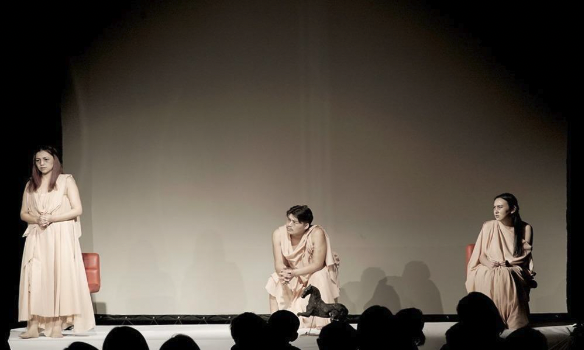Doctors inflict us pain and give us bitter pills, so that we may carry on with our lives for a little longer and, hopefully, better. Philosophers are like doctors of the mind and soul — they make us think hard, so that we may live more, mindfully, with a wider perspective on the world and ourselves. The symptoms and ailments of modern societies may differ from those that Friedrich Nietzsche (1844-1900) and Jean-Paul Sartre (1905-1980) saw in their lifetime, but the pertinence of their wisdom testifies that we might be dealing with the same problems under different circumstances. Maladies like loss of self, herd mentality, loneliness, greed, blind faith, vanity are as tangible now as ever in societies around the world.
21st century Mongolia is one of them. We plaster the image of Chinggis Khaan on every bottle, building and billboard, yet throw trash and spit on the grounds that he worshiped. We inflate our egos by calling ourselves “the descendants of Chinggis Khaan” yet deplete our energy and resources with vodka in his name. We borrow money from abroad and call it Chinggis and Khubilai bonds, while ignoring the fact that our own little “khubilais” will have to repay the loan some day. We are in dire need of the remedy that philosophers offer. Through the culture that philosophy instills in society, philosophy helps uproot the proverbial weeds that affect the mind and obscure our future.
With this picture in the background, a sobering event is a series of plays with philosophical themes, two of which were recently presented by a small privately-owned experimental theatre in Ulaanbaatar. With all hundred and fifty seats full of spectators, the Blackbox Theatre launched the series with a play by Igor Tarasevich (1951- ), Как Говорил Заратустра (How Spoke Zarathustra, 2011) translated into Mongolian from the original by B.Bataa and directed by J.Amarzaya. The one-act fantasy tragicomedy imagines how Nietzsche would have conceived of the idea for Übermensch in Thus Spoke Zarathustra: A Book for All and None. In a psychiatric clinic, Nietzsche hallucinates and converses about his condition with Louise Ott, Mathilde Trampedach, Richard and Cosima Wagner. By the end of the play, Nietzsche’s sister Elisabeth, doctor and priest who were all sane in the beginning, are affected by his hallucinations. Tarasevich advocates that in declaring “God is dead”, Nietzsche strove to awaken people from their superstitious adorations of higher powers, and to take responsibility of our actions in order to create meaning in our lives.


The second play was Sartre’s Huis Clos (No Exit, 1944), translated from English by B.Tsatsral and directed by M.Boroldoi. The existentialist one-act classic is about three protagonists imprisoned in their afterlife for eternity in an empty chamber with three chairs, a sculpture and a knife. They realize that “hell is other people” and not a hot place where the devil awaits the damned. As the play unfolds, all three characters tell their life stories and expose who they really are to the other two. Each one represents an ineluctable weakness of another character who torments them for it. And so, their punishment continues ad infinitum. Sartre suggests that human beings are endowed with free will to determine the actions they take in life and are consequently judged by those whom they leave behind when they die.



Theatre in Mongolia has a strong foundation based on the traditions of Stanislavski’s method of acting. It is not a surprise therefore that the Blackbox Theatre company was able to successfully brave the uncharted territories of the abstruse subject of Nietzsche and Sartre’s philosophy in Mongolian. It was evident that the actors and the company dedicated their creativity, talent and goodwill toward these productions. An audience full of young and educated Mongols signaled that there is a growing demand for thought provoking performances such as the plays staged in Blackbox Theatre.
In today’s Mongolian society, where popular mass entertainment of choice is khoshin shog (staged parodies of contemporary life in Mongolia) or soap operas on television, the series of philosophical plays are filling an important niche for another kind of Mongolian audience. The performing arts are a magnificent form of art where powerful messages can be conveyed through figurative means with refined gestures, language and intonation. Mastery of these elements will distinguish a theatre from the farcical imitations of life in other forms of entertainment. The Mongolian audience eagerly awaits the continuation of the series of philosophical plays in spring 2020.

By Ariunaa Jargalsaikhan
Published in UB Post on December 06th, 2019 Ulaanbaatar






